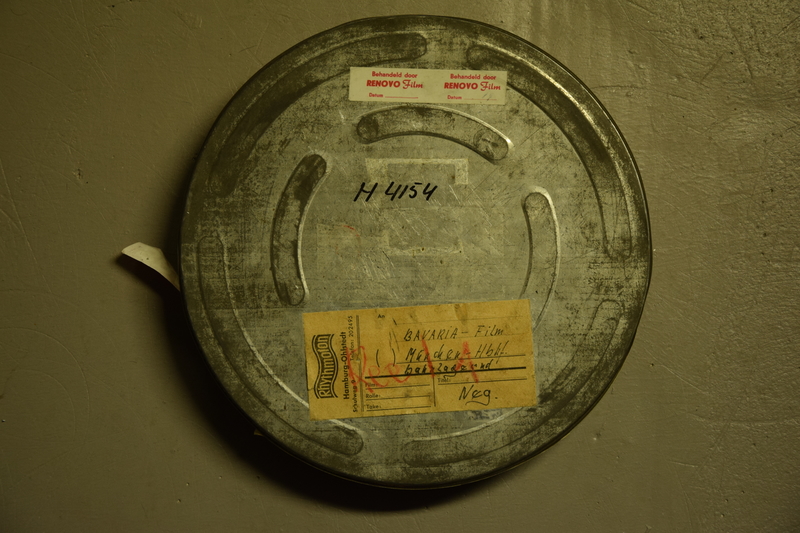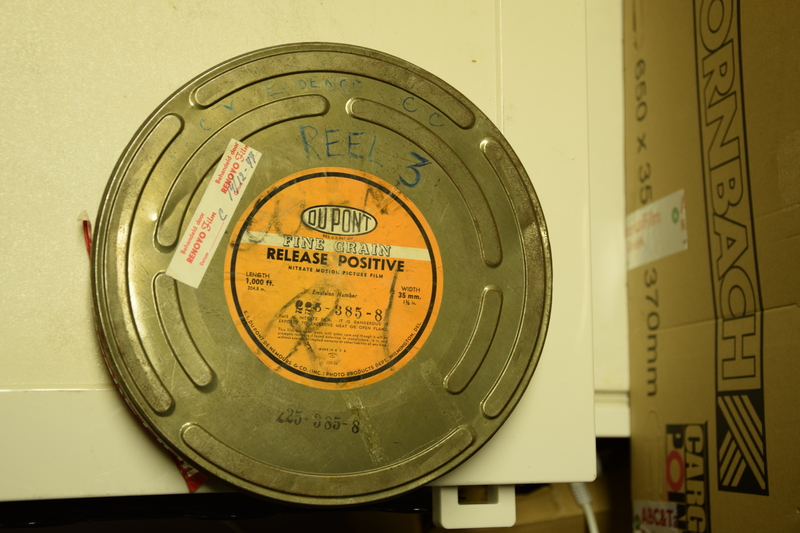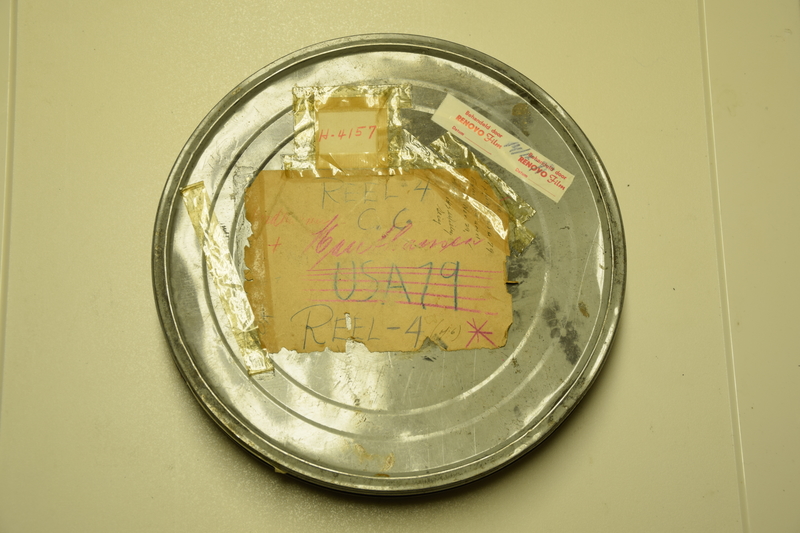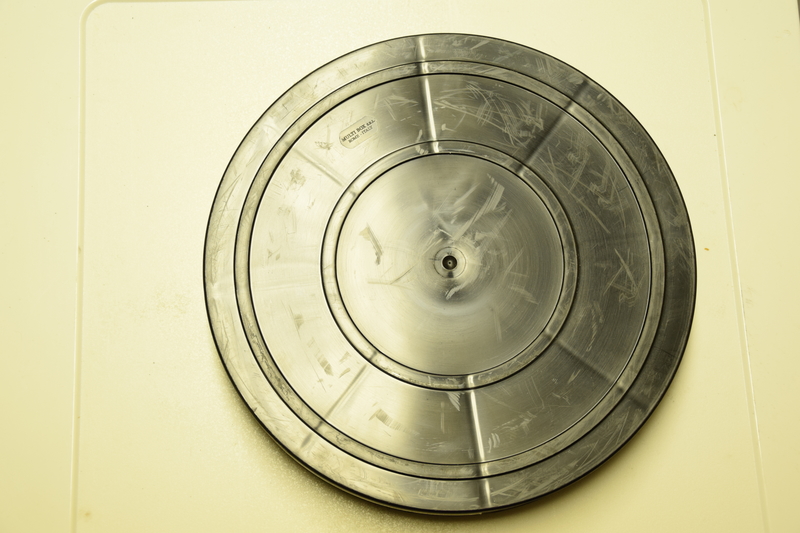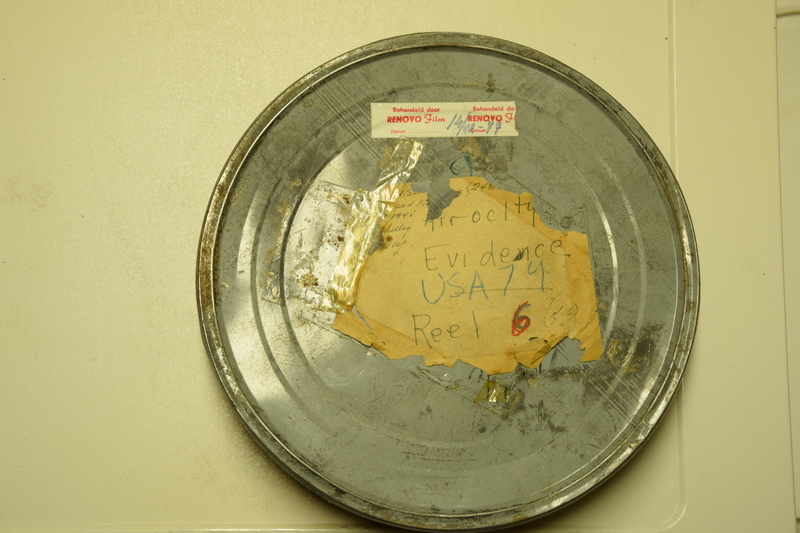Overview
- Description
- "Nazi Concentration Camps" was compiled as evidence and shown at the Nuremberg Trials on November 29, 1945 as Prosecution Exhibit #230. It contains film evidence of Nazi atrocities at the concentration camps of Leipzig, Penig, Ohrdruf, Hadamar, Breendonck, Hanover, Arnstadt, Nordhausen, Mauthausen, Buchenwald, Dachau, and Belsen. The film was produced for the U.S. Counsel for Prosecution of Axis Criminality in 1945. It was directed by Navy Cmdrs. James B. Donovan and E. Ray Kellogg. George C. Stevens was responsible for directing the photography and filming of the concentration camps as liberated by Allied forces.
- Film Title
-
Nazi Concentration Camps
- Duration
- 00:19:00
- Date
-
Production:
1945
- Locale
-
Dachau,
Germany
Penig, Germany
Belsen, Germany
Mauthausen, Austria
Breendonck, Belgium
Hadamar, Germany
Ohrdruf, Germany
Buchenwald, Germany
Arnstadt, Germany
Leipzig, Germany
Nordhausen, Germany
Hannover, Germany
- Credit
- Accessed at United States Holocaust Memorial Museum, courtesy of the International Court of Justice
- Contributor
-
Director:
E. R. Kellogg
Director: George C. Stevens
Director: James B. Donovan
Producer: United States. Army. Signal Corps.
- Biography
-
United States Navy Lieutenant E. R. Kellogg certifies motion pictures of Nazi concentration camps in an affidavit presented in the "Nazi Concentration Camps" film by the Americans as evidence during the International Military Tribunal at Nuremberg. Kellogg had expertise in motion picture and photographic techniques through his employment with Twentieth Century Fox Studios in California from 1929 to 1941. He attests that he has thoroughly examined the concentration camp liberation films of the Army Signal Corps and found them to be unaltered, genuine, and true copies of the originals in the U.S. Army Signal Corps vaults.
George Stevens (December 18, 1904 – March 8, 1975) was an American film director, producer, screenwriter and cinematographer. During World War II, Stevens joined the U.S. Army Signal Corps and headed a film unit from 1943 to 1946 under General Eisenhower. His unit shot footage documenting D-Day — including the only Allied European Front color film of the war — the liberation of Paris and the meeting of American and Soviet forces at the Elbe River, as well as horrific scenes from the Duben labor camp and the Dachau concentration camp. Stevens also helped prepare the Duben and Dachau footage and other material for presentation during the Nuremberg Trials. In 2008, his footage was entered into the U.S. National Film Registry by the Librarian of Congress as an "essential visual record" of World War II.
James B. Donovan. United States Navy Commander. Associate Prosecutor at the Nuremberg Trials, where he coordinated and presented all Nazi films at the trials. General Counsel to OSS. Negotiated the exchange of Bay of Pigs prisoners with Fidel Castro as an independent lawyer under backdrop of the missile crisis, securing the freedom of nearly 10,000 people. Portrayed by Tom Hanks in "Bridge of Spies".
Physical Details
- Language
- English
- Genre/Form
- Documentary.
- B&W / Color
- Black & White
- Image Quality
- Excellent
- Film Format
- Master
Master 4291 Digital: DPX 2.5K - b&w - sound - HD
Master 4292 Digital: DPX 2.5K - b&w - sound - HD
Master 4293 Digital: DPX 2.5K - b&w - sound - HD
Master 4294 Digital: DPX 2.5K - b&w - sound - HD
Master 4295 Digital: DPX 2.5K - b&w - sound - HD
Master 4296 Digital: DPX 2.5K - b&w - sound - HD
Master 4291 Digital: DPX 2.5K - b&w - sound - HD
Master 4292 Digital: DPX 2.5K - b&w - sound - HD
Master 4293 Digital: DPX 2.5K - b&w - sound - HD
Master 4294 Digital: DPX 2.5K - b&w - sound - HD
Master 4295 Digital: DPX 2.5K - b&w - sound - HD
Master 4296 Digital: DPX 2.5K - b&w - sound - HD
Master 4291 Digital: DPX 2.5K - b&w - sound - HD
Master 4292 Digital: DPX 2.5K - b&w - sound - HD
Master 4293 Digital: DPX 2.5K - b&w - sound - HD
Master 4294 Digital: DPX 2.5K - b&w - sound - HD
Master 4295 Digital: DPX 2.5K - b&w - sound - HD
Master 4296 Digital: DPX 2.5K - b&w - sound - HD
Master 4291 Digital: DPX 2.5K - b&w - sound - HD
Master 4292 Digital: DPX 2.5K - b&w - sound - HD
Master 4293 Digital: DPX 2.5K - b&w - sound - HD
Master 4294 Digital: DPX 2.5K - b&w - sound - HD
Master 4295 Digital: DPX 2.5K - b&w - sound - HD
Master 4296 Digital: DPX 2.5K - b&w - sound - HD
Rights & Restrictions
- Conditions on Access
- You do not require further permission from the Museum to access this archival media.
- Copyright
- International Court of Justice
- Conditions on Use
- Researchers must obtain permission from the International Court of Justice to copy and use any of the sound and film recordings in this collection. Contact the Library of the Court at library@icj-cij.org.
- Copyright Holder
- International Court of Justice
Keywords & Subjects
- Keyword
- ATROCITIES CAMERA OPERATORS CAMERAS CONCENTRATION CAMPS CONCENTRATION CAMPS (LIBERATION) CORPSES DISEASES DISINFECTION DOCTORS EISENHOWER, DWIGHT FILMS GERMANY HANOVER-AHLEM HUMAN SKIN MILITARY OFFICERS MILITARY POLICE MILITARY VEHICLES NUREMBERG (INTERNATIONAL MILITARY TRIBUNAL) NURSES PENIG ROSENSAFT, HADASSAH SOLDIERS/MILITARY SOLDIERS/MILITARY (ALLIES) SURVIVORS SURVIVORS (JEWISH) SURVIVORS (POLISH) SURVIVORS (SOVIET) TRUCKS WAR CRIMINALS/WAR CRIMES TRIALS WOMEN
Administrative Notes
- Legal Status
- Permanent Collection
- Film Provenance
- The archives of the Nuremberg International Military Tribunal were entrusted to the International Court of Justice by a decision of the Tribunal on October 1, 1946. The archives were transported to the Peace Palace, where representatives of the Tribunal and the staff of the Court took delivery of them on March 14, 1950. The Nuremberg Archives consist of the films presented as evidence during the trial, written documents, and gramophone disc recordings of the hearings. The UN, United States Holocaust Memorial Museum, and the Memorial de la Shoah, cooperatively digitized the film, audio, and microfilm components of the Nuremberg Archives in an agreement signed in July 2017. The digital transfers from 37 original 35mm nitrate films were received in May 2018.
- Note
- The film has also been called "Concentration Camps in Germany, 1939-1945." Refer to RG-60.4500 for another version of this film from NARA.
- Copied From
- 35mm nitrate
- Film Source
- International Court of Justice
Mémorial de la Shoah, Centre de Documentation Juive Contemporaine - File Number
- Source Archive Number: H 4154
Source Archive Number: H 4155
Source Archive Number: H 4156
Source Archive Number: H 4157
Source Archive Number: H 4158
Source Archive Number: H 4159 - Special Collection
-
Steven Spielberg Film and Video Archive
- Record last modified:
- 2024-02-21 07:58:30
- This page:
- https://collections.ushmm.org/search/catalog/irn616441
Additional Resources
Download & Licensing
- Request Copy
- See Rights and Restrictions
- Terms of Use
- This record is digitized but cannot be downloaded online.
In-Person Research
- Available for Research
- Plan a Research Visit
Contact Us
Also in Archives of the Nuremberg International Military Tribunal
Digital copies of the audio, film, and paper components of the Archives of the International Military Tribunal of Nuremberg. The original materials include: 1,942 cut gramophone discs of audio recordings of the hearings of the IMT; 37 rolls of 35mm nitrate films used as evidence during the trial; and 269,093 pages of documents (exhibits submitted to the Tribunal; trial briefs; minutes; lists).
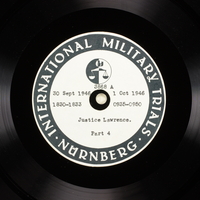
Day 218 International Military Tribunal, Nuremberg (Set A)
Recorded Sound

Day 214 International Military Tribunal, Nuremberg (Set A)
Recorded Sound
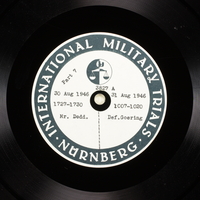
Day 215 International Military Tribunal, Nuremberg (Set A)
Recorded Sound
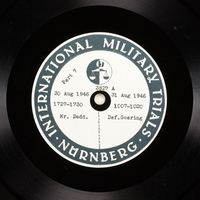
Day 216 International Military Tribunal, Nuremberg (Set A)
Recorded Sound

Day 217 International Military Tribunal, Nuremberg (Set A)
Recorded Sound
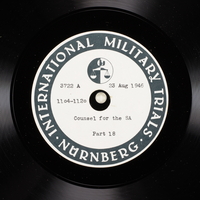
Day 210 International Military Tribunal, Nuremberg (Set A)
Recorded Sound

Day 211 International Military Tribunal, Nuremberg (Set A)
Recorded Sound

Day 212 International Military Tribunal, Nuremberg (Set A)
Recorded Sound
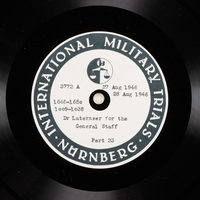
Day 213 International Military Tribunal, Nuremberg (Set A)
Recorded Sound

Day 206 International Military Tribunal, Nuremberg (Set A)
Recorded Sound
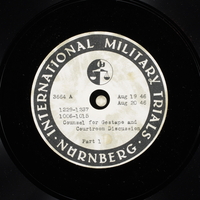
Day 207 International Military Tribunal, Nuremberg (Set A)
Recorded Sound
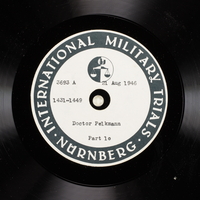
Day 208 International Military Tribunal, Nuremberg (Set A)
Recorded Sound
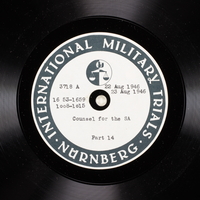
Day 209 International Military Tribunal, Nuremberg (Set A)
Recorded Sound
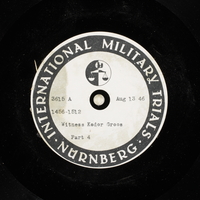
Day 202 International Military Tribunal, Nuremberg (Set A)
Recorded Sound

Day 203 International Military Tribunal, Nuremberg (Set A)
Recorded Sound
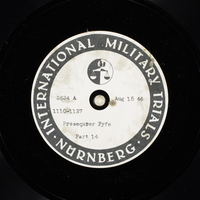
Day 204 International Military Tribunal, Nuremberg (Set A)
Recorded Sound
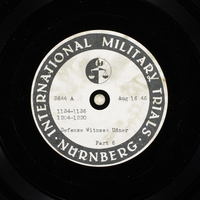
Day 205 International Military Tribunal, Nuremberg (Set A)
Recorded Sound
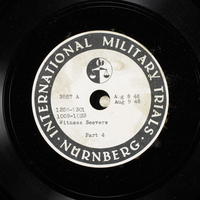
Day 199 International Military Tribunal, Nuremberg (Set A)
Recorded Sound
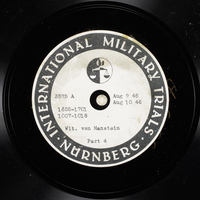
Day 200 International Military Tribunal, Nuremberg (Set A)
Recorded Sound
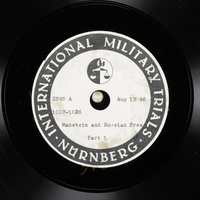
Day 201 International Military Tribunal, Nuremberg (Set A)
Recorded Sound
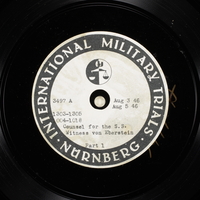
Day 195 International Military Tribunal, Nuremberg (Set A)
Recorded Sound
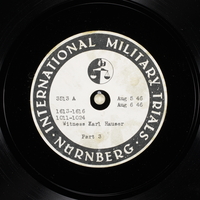
Day 196 International Military Tribunal, Nuremberg (Set A)
Recorded Sound

Day 197 International Military Tribunal, Nuremberg (Set A)
Recorded Sound

Day 198 International Military Tribunal, Nuremberg (Set A)
Recorded Sound
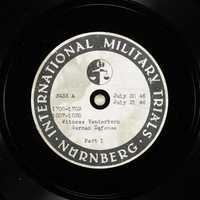
Day 191 International Military Tribunal, Nuremberg (Set A)
Recorded Sound
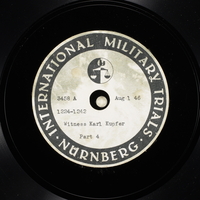
Day 192 International Military Tribunal, Nuremberg (Set A)
Recorded Sound
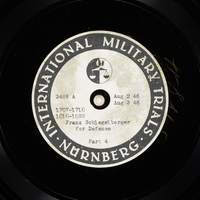
Day 193 International Military Tribunal, Nuremberg (Set A)
Recorded Sound
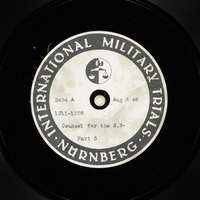
Day 194 International Military Tribunal, Nuremberg (Set A)
Recorded Sound
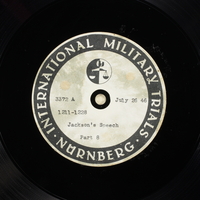
Day 187 International Military Tribunal, Nuremberg (Set A)
Recorded Sound
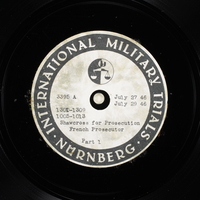
Day 188 International Military Tribunal, Nuremberg (Set A)
Recorded Sound
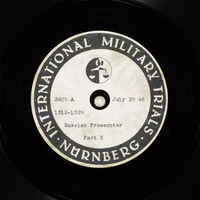
Day 189 International Military Tribunal, Nuremberg (Set A)
Recorded Sound
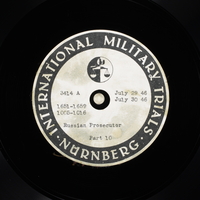
Day 190 International Military Tribunal, Nuremberg (Set A)
Recorded Sound
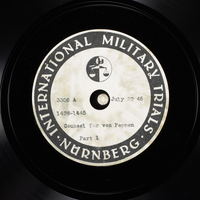
Day 183 International Military Tribunal, Nuremberg (Set A)
Recorded Sound
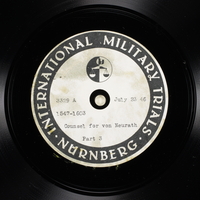
Day 184 International Military Tribunal, Nuremberg (Set A)
Recorded Sound
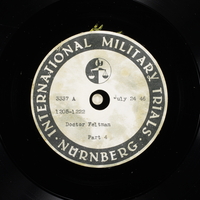
Day 185 International Military Tribunal, Nuremberg (Set A)
Recorded Sound
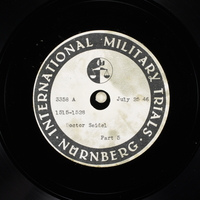
Day 186 International Military Tribunal, Nuremberg (Set A)
Recorded Sound

Day 179 International Military Tribunal, Nuremberg (Set A)
Recorded Sound
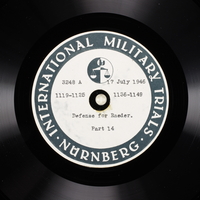
Day 180 International Military Tribunal, Nuremberg (Set A)
Recorded Sound
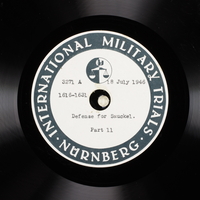
Day 181 International Military Tribunal, Nuremberg (Set A)
Recorded Sound
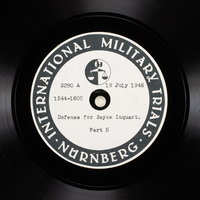
Day 182 International Military Tribunal, Nuremberg (Set A)
Recorded Sound
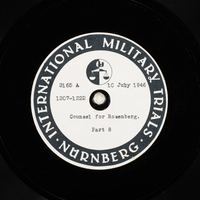
Day 175 International Military Tribunal, Nuremberg (Set A)
Recorded Sound
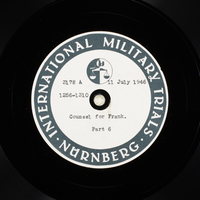
Day 176 International Military Tribunal, Nuremberg (Set A)
Recorded Sound
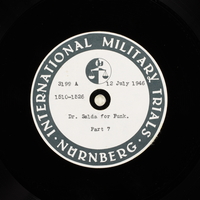
Day 177 International Military Tribunal, Nuremberg (Set A)
Recorded Sound
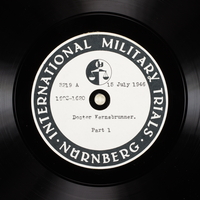
Day 178 International Military Tribunal, Nuremberg (Set A)
Recorded Sound
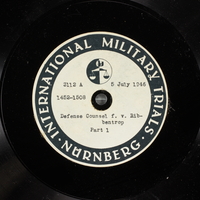
Day 172 International Military Tribunal, Nuremberg (Set A)
Recorded Sound

Day 173 International Military Tribunal, Nuremberg (Set A)
Recorded Sound
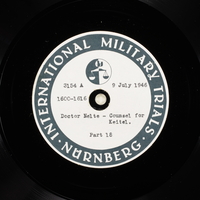
Day 174 International Military Tribunal, Nuremberg (Set A)
Recorded Sound
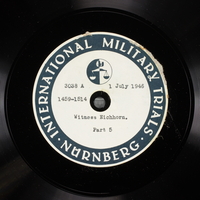
Day 168 International Military Tribunal, Nuremberg (Set A)
Recorded Sound

Day 169 International Military Tribunal, Nuremberg (Set A)
Recorded Sound
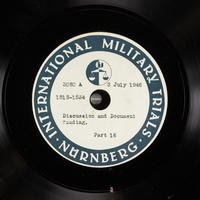
Day 170 International Military Tribunal, Nuremberg (Set A)
Recorded Sound
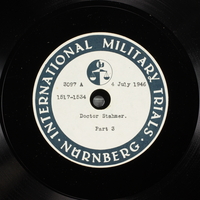
Day 171 International Military Tribunal, Nuremberg (Set A)
Recorded Sound
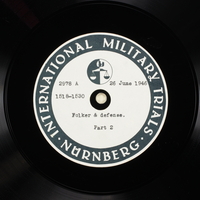
Day 164 International Military Tribunal, Nuremberg (Set A)
Recorded Sound
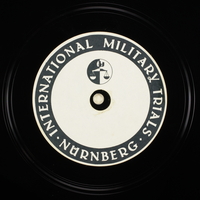
Day 165 International Military Tribunal, Nuremberg (Set A)
Recorded Sound
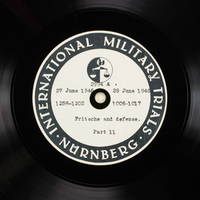
Day 166 International Military Tribunal, Nuremberg (Set A)
Recorded Sound
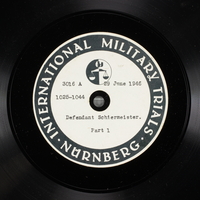
Day 167 International Military Tribunal, Nuremberg (Set A)
Recorded Sound
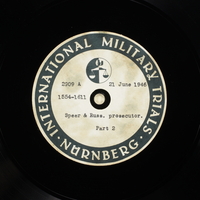
Day 160 International Military Tribunal, Nuremberg (Set A)
Recorded Sound
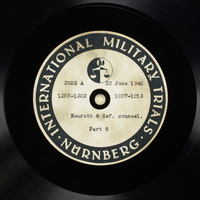
Day 161 International Military Tribunal, Nuremberg (Set A)
Recorded Sound
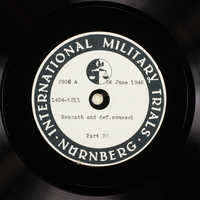
Day 162 International Military Tribunal, Nuremberg (Set A)
Recorded Sound
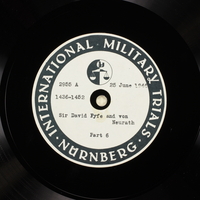
Day 163 International Military Tribunal, Nuremberg (Set A)
Recorded Sound
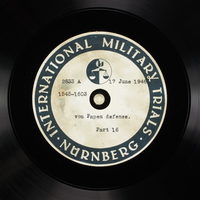
Day 156 International Military Tribunal, Nuremberg (Set A)
Recorded Sound

Day 157 International Military Tribunal, Nuremberg (Set A)
Recorded Sound
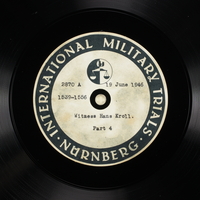
Day 158 International Military Tribunal, Nuremberg (Set A)
Recorded Sound

Day 159 International Military Tribunal, Nuremberg (Set A)
Recorded Sound

Day 152 International Military Tribunal, Nuremberg (Set A)
Recorded Sound
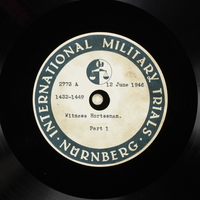
Day 153 International Military Tribunal, Nuremberg (Set A)
Recorded Sound
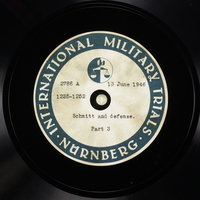
Day 154 International Military Tribunal, Nuremberg (Set A)
Recorded Sound

Day 155 International Military Tribunal, Nuremberg (Set A)
Recorded Sound
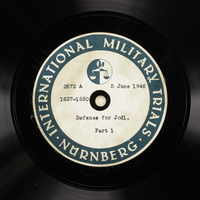
Day 148 International Military Tribunal, Nuremberg (Set A)
Recorded Sound
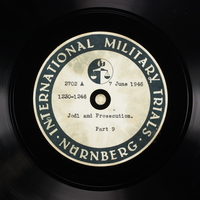
Day 149 International Military Tribunal, Nuremberg (Set A)
Recorded Sound
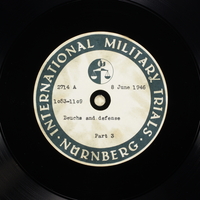
Day 150 International Military Tribunal, Nuremberg (Set A)
Recorded Sound
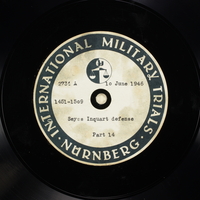
Day 151 International Military Tribunal, Nuremberg (Set A)
Recorded Sound
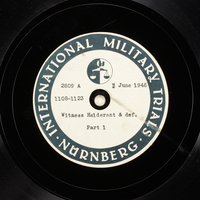
Day 144 International Military Tribunal, Nuremberg (Set A)
Recorded Sound
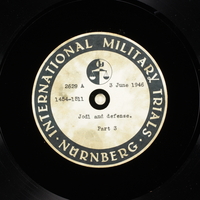
Day 145 International Military Tribunal, Nuremberg (Set A)
Recorded Sound
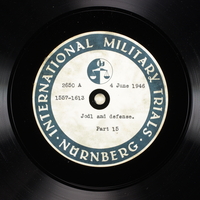
Day 146 International Military Tribunal, Nuremberg (Set A)
Recorded Sound
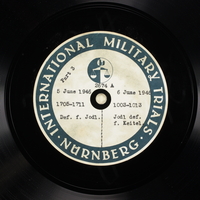
Day 147 International Military Tribunal, Nuremberg (Set A)
Recorded Sound

Day 140 International Military Tribunal, Nuremberg (Set A)
Recorded Sound
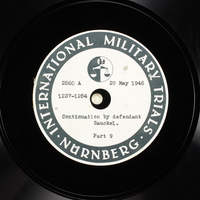
Day 141 International Military Tribunal, Nuremberg (Set A)
Recorded Sound
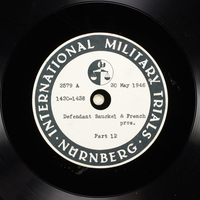
Day 142 International Military Tribunal, Nuremberg (Set A)
Recorded Sound

Day 143 International Military Tribunal, Nuremberg (Set A)
Recorded Sound
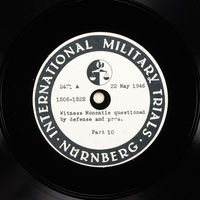
Day 136 International Military Tribunal, Nuremberg (Set A)
Recorded Sound
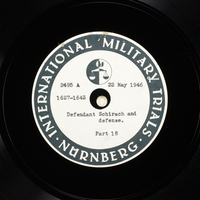
Day 137 International Military Tribunal, Nuremberg (Set A)
Recorded Sound
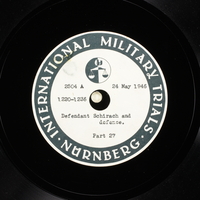
Day 138 International Military Tribunal, Nuremberg (Set A)
Recorded Sound

Day 139 International Military Tribunal, Nuremberg (Set A)
Recorded Sound
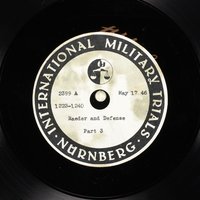
Day 132 International Military Tribunal, Nuremberg (Set A)
Recorded Sound
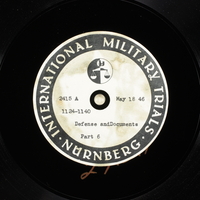
Day 133 International Military Tribunal, Nuremberg (Set A)
Recorded Sound
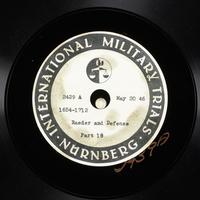
Day 134 International Military Tribunal, Nuremberg (Set A)
Recorded Sound
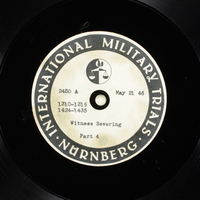
Day 135 International Military Tribunal, Nuremberg (Set A)
Recorded Sound

Day 128 International Military Tribunal, Nuremberg (Set A)
Recorded Sound
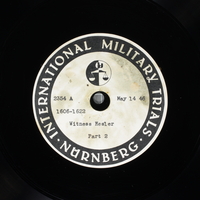
Day 129 International Military Tribunal, Nuremberg (Set A)
Recorded Sound

Day 130 International Military Tribunal, Nuremberg (Set A)
Recorded Sound
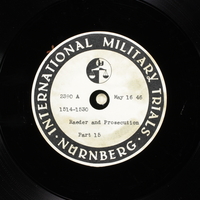
Day 131 International Military Tribunal, Nuremberg (Set A)
Recorded Sound
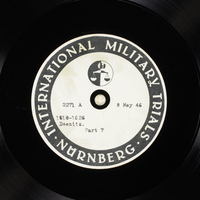
Day 124 International Military Tribunal, Nuremberg (Set A)
Recorded Sound
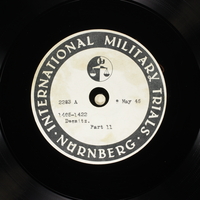
Day 125 International Military Tribunal, Nuremberg (Set A)
Recorded Sound
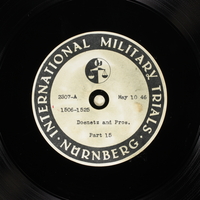
Day 126 International Military Tribunal, Nuremberg (Set A)
Recorded Sound
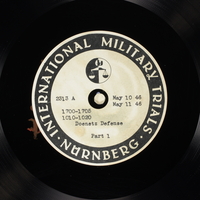
Day 127 International Military Tribunal, Nuremberg (Set A)
Recorded Sound

Day 13 International Military Tribunal, Nuremberg (Set A)
Recorded Sound

Day 122 International Military Tribunal, Nuremberg (Set A)
Recorded Sound
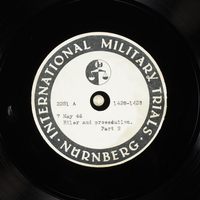
Day 123 International Military Tribunal, Nuremberg (Set A)
Recorded Sound

Day 8 International Military Tribunal, Nuremberg (Set A)
Recorded Sound

Day 9 International Military Tribunal, Nuremberg (Set A)
Recorded Sound

Day 10 International Military Tribunal, Nuremberg (Set A)
Recorded Sound

Day 11 International Military Tribunal, Nuremberg (Set A)
Recorded Sound

Day 12 International Military Tribunal, Nuremberg (Set A)
Recorded Sound

Day 5 International Military Tribunal, Nuremberg (Set A)
Recorded Sound
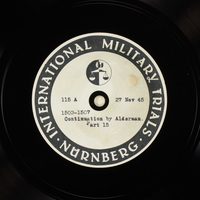
Day 6 International Military Tribunal, Nuremberg (Set A)
Recorded Sound

Day 7 International Military Tribunal, Nuremberg (Set A)
Recorded Sound

Day 119 International Military Tribunal, Nuremberg (Set A)
Recorded Sound
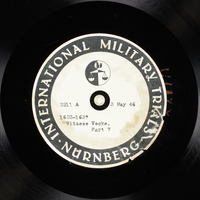
Day 120 International Military Tribunal, Nuremberg (Set A)
Recorded Sound
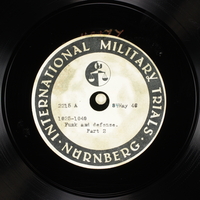
Day 121 International Military Tribunal, Nuremberg (Set A)
Recorded Sound

Day 4 International Military Tribunal, Nuremberg (Set A)
Recorded Sound
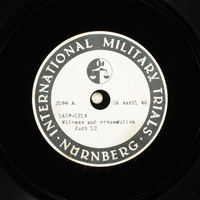
Day 115 International Military Tribunal, Nuremberg (Set A)
Recorded Sound
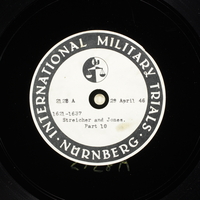
Day 116 International Military Tribunal, Nuremberg (Set A)
Recorded Sound

Day 117 International Military Tribunal, Nuremberg (Set A)
Recorded Sound
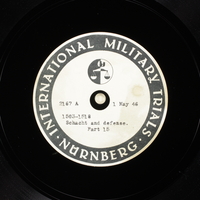
Day 118 International Military Tribunal, Nuremberg (Set A)
Recorded Sound
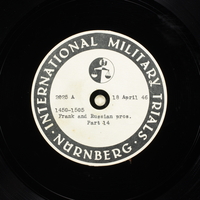
Day 111 International Military Tribunal, Nuremberg (Set A)
Recorded Sound
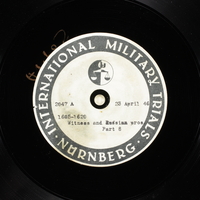
Day 112 International Military Tribunal, Nuremberg (Set A)
Recorded Sound

Day 113 International Military Tribunal, Nuremberg (Set A)
Recorded Sound

Day 114 International Military Tribunal, Nuremberg (Set A)
Recorded Sound

Day 107 International Military Tribunal, Nuremberg (Set A)
Recorded Sound
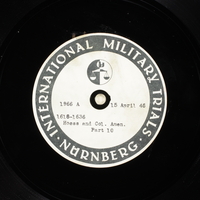
Day 108 International Military Tribunal, Nuremberg (Set A)
Recorded Sound
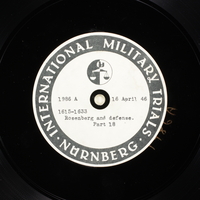
Day 109 International Military Tribunal, Nuremberg (Set A)
Recorded Sound

Day 110 International Military Tribunal, Nuremberg (Set A)
Recorded Sound
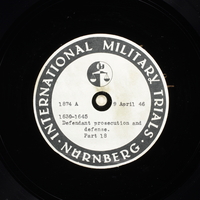
Day 103 International Military Tribunal, Nuremberg (Set A)
Recorded Sound
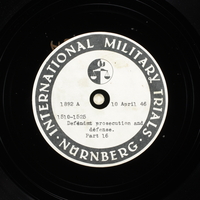
Day 104 International Military Tribunal, Nuremberg (Set A)
Recorded Sound
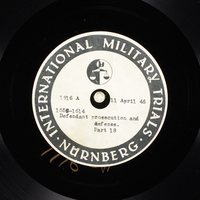
Day 105 International Military Tribunal, Nuremberg (Set A)
Recorded Sound
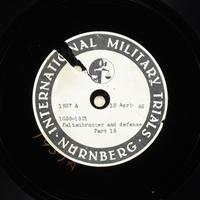
Day 106 International Military Tribunal, Nuremberg (Set A)
Recorded Sound
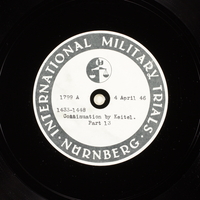
Day 99 International Military Tribunal, Nuremberg (Set A)
Recorded Sound
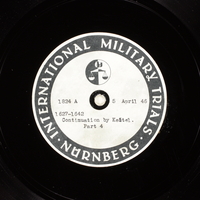
Day 100 International Military Tribunal, Nuremberg (Set A)
Recorded Sound
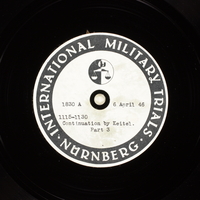
Day 101 International Military Tribunal, Nuremberg (Set A)
Recorded Sound
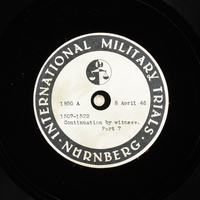
Day 102 International Military Tribunal, Nuremberg (Set A)
Recorded Sound
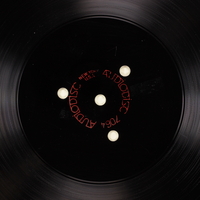
Day 95 International Military Tribunal, Nuremberg (Set A)
Recorded Sound
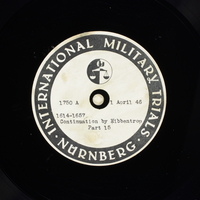
Day 96 International Military Tribunal, Nuremberg (Set A)
Recorded Sound
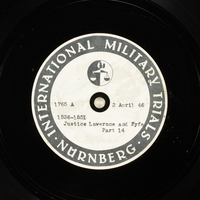
Day 97 International Military Tribunal, Nuremberg (Set A)
Recorded Sound

Day 98 International Military Tribunal, Nuremberg (Set A)
Recorded Sound
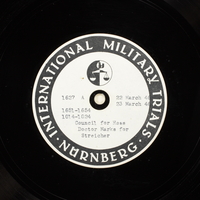
Day 89 International Military Tribunal, Nuremberg (Set A)
Recorded Sound
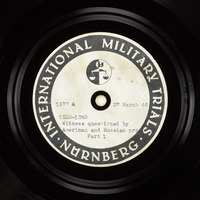
Day 92 International Military Tribunal, Nuremberg (Set A)
Recorded Sound
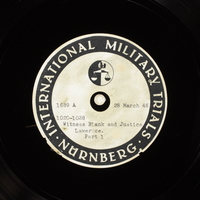
Day 93 International Military Tribunal, Nuremberg (Set A)
Recorded Sound
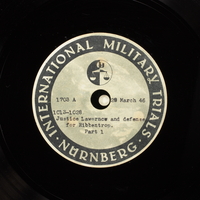
Day 94 International Military Tribunal, Nuremberg (Set A)
Recorded Sound
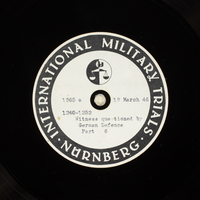
Day 85 International Military Tribunal, Nuremberg (Set A)
Recorded Sound
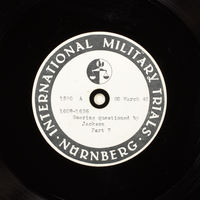
Day 86 International Military Tribunal, Nuremberg (Set A)
Recorded Sound
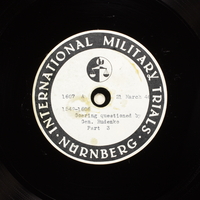
Day 87 International Military Tribunal, Nuremberg (Set A)
Recorded Sound
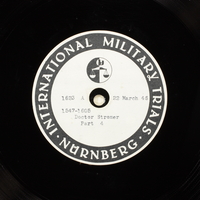
Day 88 International Military Tribunal, Nuremberg (Set A)
Recorded Sound
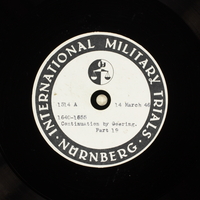
Day 81 International Military Tribunal, Nuremberg (Set A)
Recorded Sound
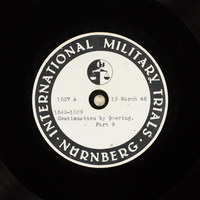
Day 82 International Military Tribunal, Nuremberg (Set A)
Recorded Sound
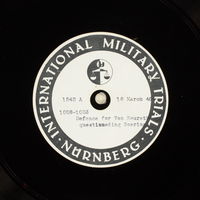
Day 83 International Military Tribunal, Nuremberg (Set A)
Recorded Sound
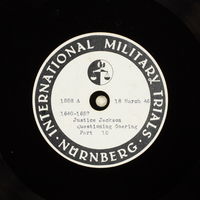
Day 84 International Military Tribunal, Nuremberg (Set A)
Recorded Sound
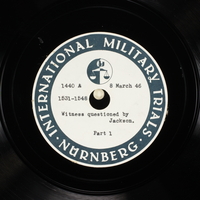
Day 77 International Military Tribunal, Nuremberg (Set A)
Recorded Sound
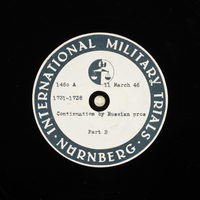
Day 78 International Military Tribunal, Nuremberg (Set A)
Recorded Sound
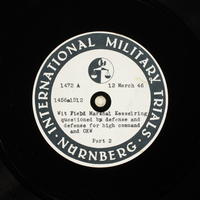
Day 79 International Military Tribunal, Nuremberg (Set A)
Recorded Sound
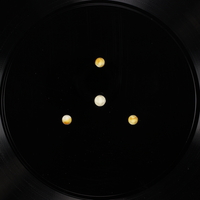
Day 80 International Military Tribunal, Nuremberg (Set A)
Recorded Sound
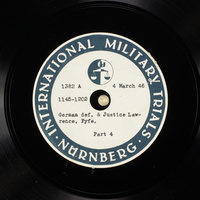
Day 73 International Military Tribunal, Nuremberg (Set A)
Recorded Sound
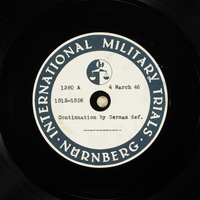
Day 74 International Military Tribunal, Nuremberg (Set A)
Recorded Sound
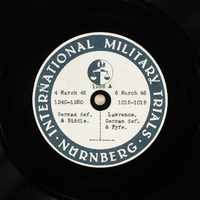
Day 75 International Military Tribunal, Nuremberg (Set A)
Recorded Sound
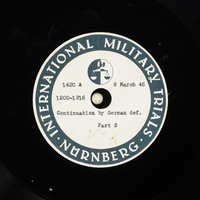
Day 76 International Military Tribunal, Nuremberg (Set A)
Recorded Sound
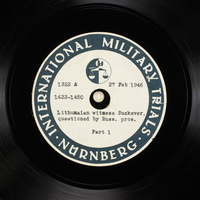
Day 69 International Military Tribunal, Nuremberg (Set A)
Recorded Sound
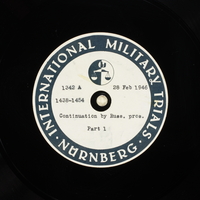
Day 70 International Military Tribunal, Nuremberg (Set A)
Recorded Sound
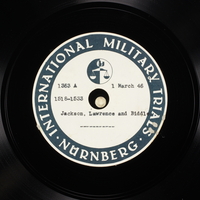
Day 71 International Military Tribunal, Nuremberg (Set A)
Recorded Sound

Day 72 International Military Tribunal, Nuremberg (Set A)
Recorded Sound
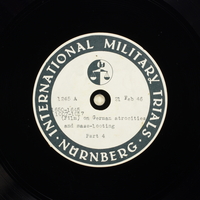
Day 65 International Military Tribunal, Nuremberg (Set A)
Recorded Sound
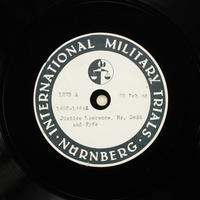
Day 66 International Military Tribunal, Nuremberg (Set A)
Recorded Sound
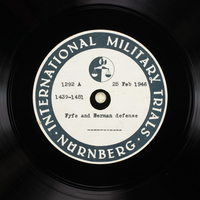
Day 67 International Military Tribunal, Nuremberg (Set A)
Recorded Sound

Day 68 International Military Tribunal, Nuremberg (Set A)
Recorded Sound
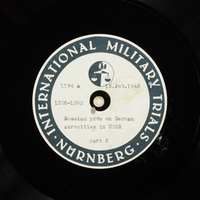
Day 61 International Military Tribunal, Nuremberg (Set A)
Recorded Sound

Day 62 International Military Tribunal, Nuremberg (Set A)
Recorded Sound
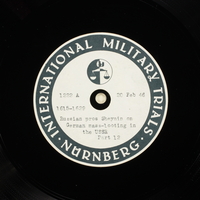
Day 63 International Military Tribunal, Nuremberg (Set A)
Recorded Sound
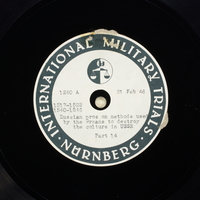
Day 64 International Military Tribunal, Nuremberg (Set A)
Recorded Sound
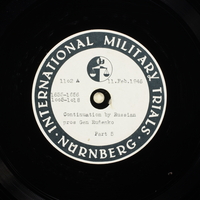
Day 57 International Military Tribunal, Nuremberg (Set A)
Recorded Sound
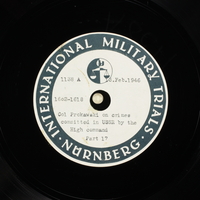
Day 58 International Military Tribunal, Nuremberg (Set A)
Recorded Sound
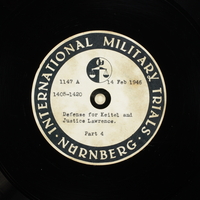
Day 59 International Military Tribunal, Nuremberg (Set A)
Recorded Sound
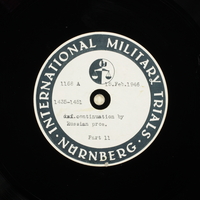
Day 60 International Military Tribunal, Nuremberg (Set A)
Recorded Sound
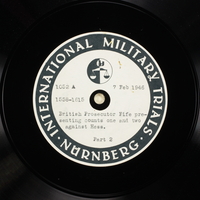
Day 53 International Military Tribunal, Nuremberg (Set A)
Recorded Sound
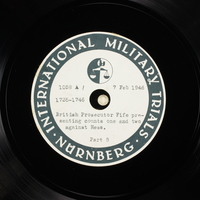
Day 54 International Military Tribunal, Nuremberg (Set A)
Recorded Sound
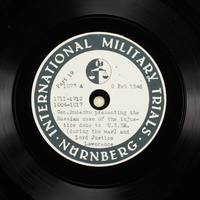
Day 55 International Military Tribunal, Nuremberg (Set A)
Recorded Sound

Day 56 International Military Tribunal, Nuremberg (Set A)
Recorded Sound
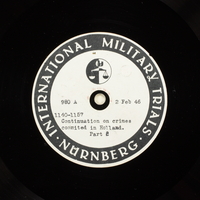
Day 49 International Military Tribunal, Nuremberg (Set A)
Recorded Sound
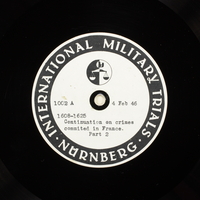
Day 50 International Military Tribunal, Nuremberg (Set A)
Recorded Sound
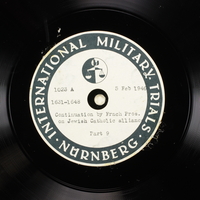
Day 51 International Military Tribunal, Nuremberg (Set A)
Recorded Sound
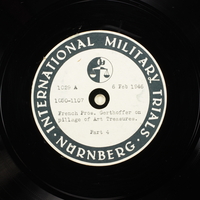
Day 52 International Military Tribunal, Nuremberg (Set A)
Recorded Sound
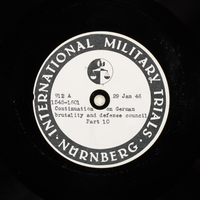
Day 45 International Military Tribunal, Nuremberg (Set A)
Recorded Sound
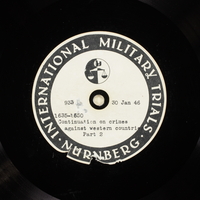
Day 46 International Military Tribunal, Nuremberg (Set A)
Recorded Sound
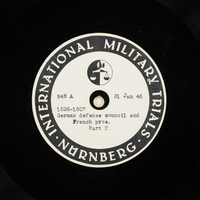
Day 47 International Military Tribunal, Nuremberg (Set A)
Recorded Sound
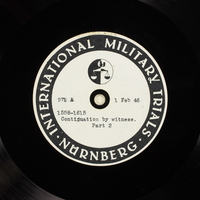
Day 48 International Military Tribunal, Nuremberg (Set A)
Recorded Sound

Day 39 International Military Tribunal, Nuremberg (Set A)
Recorded Sound

Day 40 International Military Tribunal, Nuremberg (Set A)
Recorded Sound

Day 43 International Military Tribunal, Nuremberg (Set A)
Recorded Sound
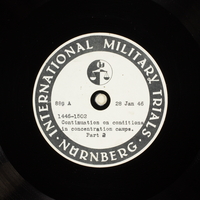
Day 44 International Military Tribunal, Nuremberg (Set A)
Recorded Sound
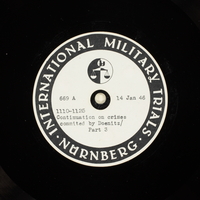
Day 33 International Military Tribunal, Nuremberg (Set A)
Recorded Sound

Day 36 International Military Tribunal, Nuremberg (Set A)
Recorded Sound
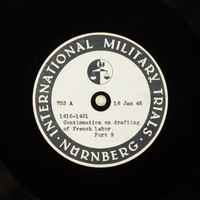
Day 37 International Military Tribunal, Nuremberg (Set A)
Recorded Sound
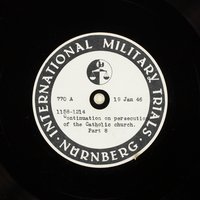
Day 38 International Military Tribunal, Nuremberg (Set A)
Recorded Sound
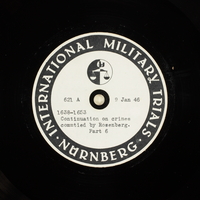
Day 30 International Military Tribunal, Nuremberg (Set A)
Recorded Sound
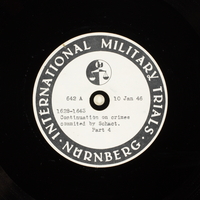
Day 31 International Military Tribunal, Nuremberg (Set A)
Recorded Sound
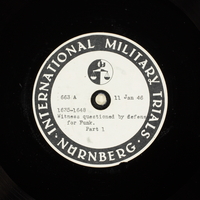
Day 32 International Military Tribunal, Nuremberg (Set A)
Recorded Sound
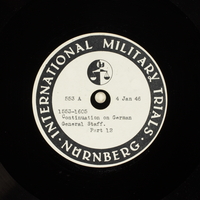
Day 27 International Military Tribunal, Nuremberg (Set A)
Recorded Sound
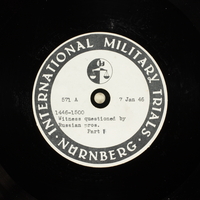
Day 28 International Military Tribunal, Nuremberg (Set A)
Recorded Sound
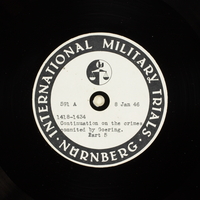
Day 29 International Military Tribunal, Nuremberg (Set A)
Recorded Sound
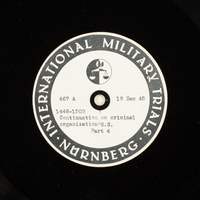
Day 23 International Military Tribunal, Nuremberg (Set A)
Recorded Sound
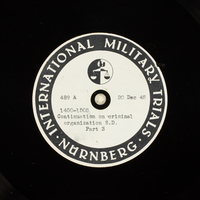
Day 24 International Military Tribunal, Nuremberg (Set A)
Recorded Sound
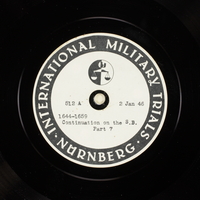
Day 25 International Military Tribunal, Nuremberg (Set A)
Recorded Sound
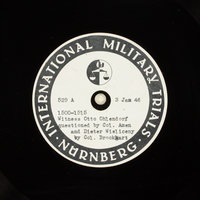
Day 26 International Military Tribunal, Nuremberg (Set A)
Recorded Sound

